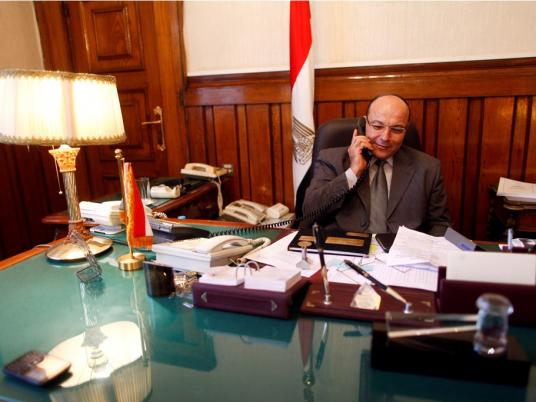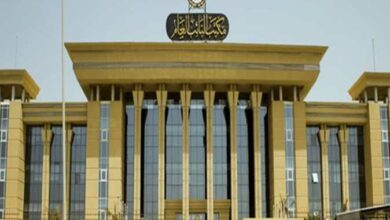
The news of the resignation of Prosecution General Talaat Abdallah and the ongoing judicial battle against the constitutional referendum filled the front pages of Egypt’s newspapers on Tuesday.
Abdallah’s surprise resignation came amid heated debates with prosecution members who protested in front of his office on Monday, against what they deemed an “invalid” decision by President Mohamed Morsy to appoint him.
Independent Al-Shorouk daily reports that Abdallah resigned “against his will” after a five-hour meeting with prosecution representatives. The private newspaper says that the top prosecutor stipulated at first that he would resign after the final result of the referendum leads to a “yes” vote, which was rejected by prosecution members, who threatened an open protest if he did not resign immediately.
Abdullah wrote a letter to the Supreme Judicial Council urging its members to accept his resignation one day after the referendum ends.
The privately owned Al-Watan describes Abdallah’s move as a result of the “prosecutor’s uprising.” The newspaper reports that the resigned prosecutor general was warmly received by the protesting prosecutors when he left his office after acquiescing to their demands. The prosecutors chanted, “Long live Egypt’s honorable judges,” the paper says.
Meanwhile, independent Al-Tahrir also reported that the State Council judges are threatening to boycott supervising the second phase of the constitutional referendum, scheduled to take place on Saturday, because what they deemed as the state’s decline to be up to its promises.
The privately-owned paper reports that the judges who agreed to monitor the first phase had given some conditions that were not met by the presidential office, including an end to the sit-in surrounding the Supreme Constitutional Court, security for judges and citizens during the referendum process, and an end to the political conflict.
Al-Watan describes the move by the State Council judge as a “painful blow” to the referendum process, which is already facing problems due to lack of enough judicial oversight.
The state-owned Al-Akhbar reports on a statement by presidential spokesperson Yasser Ali, who says the door is still open for the opposition to discuss contentious articles in the constitution and that the constitution will be passed by a simple majority vote. Ali says that the second phase of the referendum in 17 governorates includes 38 percent of eligible voters.
Meanwhile, state-owned Al-Ahram reports on a meeting led by Defense Minister Abdel Fattah al-Sisi with military leaders on Monday condemning the contentious political conflict, deeming it as a threat to the country’s wellbeing.
He praised the participation of army personnel in securing the referendum process, describing the move as a “new historical articulation of the relationship between the people and their army,” the newspaper says.
On a different note, a misdemeanor court sentenced Salafi Sheikh Abdallah Badr to a year in prison and an LE20,000 fine after being found guilty of defaming actress Elham Shaheen in his daily show aired on the religious Al-Hafez channel, according to Al-Shorouk.
The privately-owned newspaper says that the sheikh left the courtroom before the judging panel declared its decision, saying that he would look out for her future work that he deemed previously as obscene. According to the paper, Badr reiterated the insults that he recited on air against Shaheen, against which the famous actress filed a lawsuit.
In a heated interviewed with the party-affiliated Al-Wafd newspaper, prominent civil society activist Saad al-Din Ibrahim speaks about his contentious relationship with the Muslim Brotherhood as he calls on the army to intervene to protect the country from the “religious state.”
The activist, who used to enjoy very good relationship with the ruling Islamist group during the era of ousted President Hosni Mubarak, believes that President Morsy is a “kind person” but adheres to the orders of the Brotherhood. He also believes that Morsy is on his way to becoming a dictator.
Although Islamists were subject to oppression under the ousted regime, Ibrahim argues that what they have done throughout the previous months urged him to change his position toward them. He says that the Brotherhood shows a hunger for power that is apparent in their desire to “Brotherhoodize” the Egyptian state.
The director of the Ibn Khaldoun Center for Development Studies urges the Brotherhood to conduct new presidential elections to express the people’s will, expressing his hopes for a better atmosphere in which to conduct a constitutional referendum.




